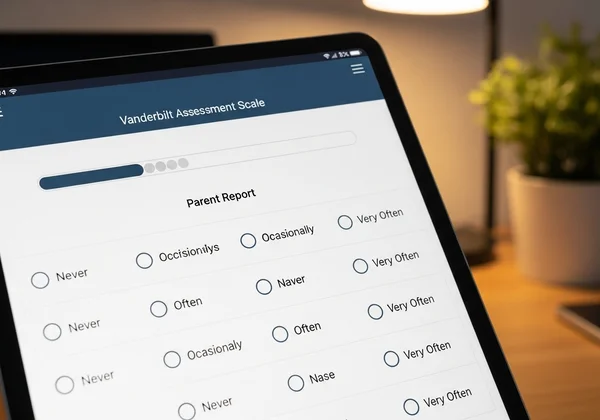早期注意力不足過動症篩查與范德堡評估:為何及早評估對兒童至關重要
作為父母,您會注意到孩子的一切——他們獨特的笑聲、他們的創造力以及他們所面臨的挑戰。有時,這些挑戰可能表現為不停地坐立不安、難以專注於功課,或頻繁地打斷他人。自然而然地,您會想知道這些行為背後的原因,以及如何最好地支援他們。這讓許多父母提出一個關鍵問題:為何要進行注意力不足過動症測試? 邁向 早期注意力不足過動症篩查 的一步,並非要給您的孩子貼上標籤;而是要更好地了解他們。這是找到正確的支援系統,幫助他們茁壯成長的第一步。如果您正在尋求清晰度,一個值得信賴的 注意力不足過動症篩查工具 可以提供您所需的初步見解。
為何早期注意力不足過動症篩查對於 6-12 歲兒童至關重要
小學時期,從 6 歲到 12 歲,是兒童巨大成長的階段。孩子們不僅在建立學術基礎,也在學習重要的社交和情感技能。當注意力不足過動症的潛在跡象未獲處理時,它們可能會對兒童生活的各個方面產生連鎖反應。早期篩查是一種積極、有效的方式,可以在小障礙變成重大阻礙之前進行干預,為您和您的孩子提供清晰度和前進的道路。

了解未經治療的注意力不足過動症對發展的影響
當孩子因未經治療的注意力不足過動症症狀而掙扎時,這並非意志力或努力的問題。他們的大腦構造與眾不同,使得專注、管理衝動和保持條理變得異常困難。這可能導致誤解和挫敗感的循環。他們可能被視為「懶惰」或「搗亂」,但實際上,他們正在努力應對自己的症狀。
這種持續的掙扎會負面地影響他們的自我認知,導致自卑感。在社交方面,他們可能會發現難以跟隨對話或在遊戲中輪流,這可能會損害友誼。了解 未經治療的注意力不足過動症的影響 是改變現狀的第一步,將其從掙扎轉變為支援。及時的 范德堡注意力不足過動症評估 可以幫助及早識別這些挑戰。
學業挑戰以及早期干預如何提供幫助
教室對於未確診注意力不足過動症的兒童來說可能是一個特別具挑戰性的環境。坐好、聽從指示和完成多步驟作業的要求可能會讓人感到不堪重負。這通常會轉化為常見的 學業挑戰:未完成的課堂作業、遺失的家庭作業、粗心大意的錯誤以及難以準備考試。
然而,早期干預可以顯著改變這種情況。當注意力不足過動症被識別後,可以實施策略來幫助孩子成功。這可能包括優先座位、將大型作業分解,或使用視覺輔助工具。一個有效的 6-12 歲注意力不足過動症干預 計劃,在初步篩查的基礎上,為老師和家長提供了工具,以創造一個讓孩子真正發光的學習環境。

透過早期注意力不足過動症支援培養兒童的社交情感健康
早期篩查最引人注目的原因之一是它對兒童情緒健康的影響。患有注意力不足過動症的兒童通常比同齡人經歷更多的社交排斥和負面反饋。他們可能難以結交和維持朋友,導致孤獨感和低自尊。內心深處,他們會感到深深的挫敗和焦慮,不明白為何簡單的任務對他們來說如此困難。
提供 及時支援 有助於驗證他們的經驗。它向他們表明,他們的挑戰是真實的,他們並不孤單。透過了解他們困難的根源,我們可以幫助他們建立韌性、發展健康的應對機制,並培養他們的 社交情感健康。這種支援基礎對於他們長期的幸福和成功至關重要。
早期注意力不足過動症診斷與干預的長期效益
及早採取行動不僅能解決當前的問題;它還為更積極的未來鋪平了道路。早期注意力不足過動症診斷 和干預的益處遠不止於課堂,它影響著孩子的自信心、人際關係和整體人生軌跡。透過在這些成長關鍵期提供支援,您賦予您的孩子終身受用的技能。一個很好的起點是 免費線上范德堡評估。
改善應對技能和自尊
當孩子們理解他們為何在某些事情上掙扎時,他們就可以開始 與 他們的大腦合作,而不是對抗他們。早期干預為他們提供了一套新的策略工具,用於管理他們的注意力、精力和情緒。他們學習如何分解任務、使用清單,以及何時需要休息。
每次他們成功運用這些 應對技能 時,他們都會建立自信。這個過程改變了他們的自我認知。他們不再認為自己「不擅長學習」,而是開始將自己視為有能力的學習者,只是需要使用不同的工具。這種 自尊 的提升是無價的,可以保護他們免受未經治療的注意力不足過動症常伴隨的焦慮和抑鬱。
建立更強的家庭動力和支援系統
無法解釋的注意力不足過動症症狀可能是家庭內部壓力的重要來源。不斷提醒做功課、為家務爭吵以及學校來電,都可能營造緊張的家庭氛圍。父母可能會感到筋疲力盡和沮喪,而孩子可能會感到被誤解和受到不公平的批評。
初步篩查和隨後的專業評估可能是一個轉捩點。它提供了一個理解行為的框架,將焦點從指責轉向支援。當家庭理解挑戰背後的「為何」時,他們就可以作為一個團隊共同努力。這種清晰度有助於 建立更強的家庭動力,為所有參與者培養同理心、耐心和更有效的溝通。

探索理解之路:為何要進行注意力不足過動症測試?
如果您注意到持續的挑戰,那麼 為何要進行注意力不足過動症測試 這個問題就變得至關重要。評估並非要找出問題;而是要找到解決方案。它提供客觀數據,可以引導與老師和醫生的對話,確保您的孩子獲得他們所需的精確支援。這是邁向清晰和行動的第一個也是最關鍵的步驟。您現在就可以在家中舒適地 開始評估。
范德堡評估量表等標準化工具的作用
為確保篩查既徹底又客觀,專業人士依賴 標準化工具。針對 6-12 歲兒童最廣泛使用和受推崇的工具之一是 范德堡評估量表。它由國家兒童健康品質研究所 (NICHQ) 開發,是一份旨在由家長和老師填寫的綜合性問卷。
該量表收集了關於兒童在不同環境中行為的詳細資訊。它不僅篩查注意力不足過動症的核心症狀(不專心、過動和衝動),還篩查常見的共病狀況,如焦慮症、抑鬱症和對立反抗症。使用 線上范德堡評估 提供了一種方便、保密的方式來收集這些重要資訊。

初步篩查的預期內容
進行 初步篩查 可能會讓人感到不安,但過程很簡單。像范德堡評估這樣的工具涉及回答一系列關於您的孩子過去六個月行為的問題。您將被要求評估您觀察特定行為的頻率,例如「未能密切注意細節」或「手腳坐立不安」。
篩查結果會提供一份有分數的報告,突出顯示關注領域。請務必記住,這是一個 篩查 工具,而非診斷工具。該報告旨在作為一個起點——一份寶貴的數據,可以與兒科醫生、心理學家或其他醫療專業人員分享,他們可以進行全面評估並提供正式診斷。您可以在線上完成問卷後立即 獲取您的報告。
邁出第一步:賦予孩子未來能力
了解孩子的獨特需求是您能給予他們最好的禮物。早期注意力不足過動症篩查是果斷而充滿愛心的一步,為他們提供所需的支援,以成功應對學業、社交和情感挑戰。它用資訊取代不確定性,用同理心取代挫敗感,用策略取代掙扎。透過現在採取行動,您不僅在解決今天的困難——您還在為自信和成功的未來奠定基礎。
您準備好深入了解您孩子的行為了嗎?今天就 邁出第一步,使用我們免費、保密的線上范德堡評估。
關於注意力不足過動症篩查與范德堡評估的常見問題
什麼是范德堡評估?
范德堡評估 是一個針對 6 至 12 歲兒童注意力不足過動症 (ADHD) 的高度受推崇篩查工具。它由國家兒童健康品質研究所 (NICHQ) 開發並由美國兒科學會推薦,包含供家長和老師評估兒童行為的問卷。它提供了一種標準化方法來衡量注意力不足過動症症狀,並篩查其他狀況,如對立反抗症 (ODD)、品行障礙、焦慮症和抑鬱症。
范德堡注意力不足過動症評估準確嗎?
是的,范德堡注意力不足過動症評估在正確使用時被認為是一種可靠且有效的 篩查 工具。其準確性來自於其標準化的問題和評分系統。然而,務必記住,它並非獨立的診斷工具。陽性的篩查結果表明,孩子應由合格的醫療專業人員進行全面評估,他們將結合篩查結果和其他資訊來做出正式診斷。
范德堡評估分數高意味著什麼?
范德堡評估分數高表明孩子顯示出大量與注意力不足過動症或其他行為/情緒狀況相關的症狀,其頻率足以需要進一步調查。這是一個強烈的信號,建議諮詢兒科醫生或兒童心理學家。我們 線上范德堡評估測試 的報告將突出顯示哪些特定領域值得關注,為該專業對話提供明確的起點。
范德堡評估篩查哪些狀況?
范德堡評估是全面的。雖然其主要重點是篩查注意力不足過動症的不同表現(注意力不集中型、過動衝動型和混合型),但它也包括篩查常見共病狀況的部分。這些狀況包括對立反抗症 (ODD)、品行障礙 (CD) 以及焦慮症和抑鬱症,從而提供兒童挑戰的更廣泛圖景。